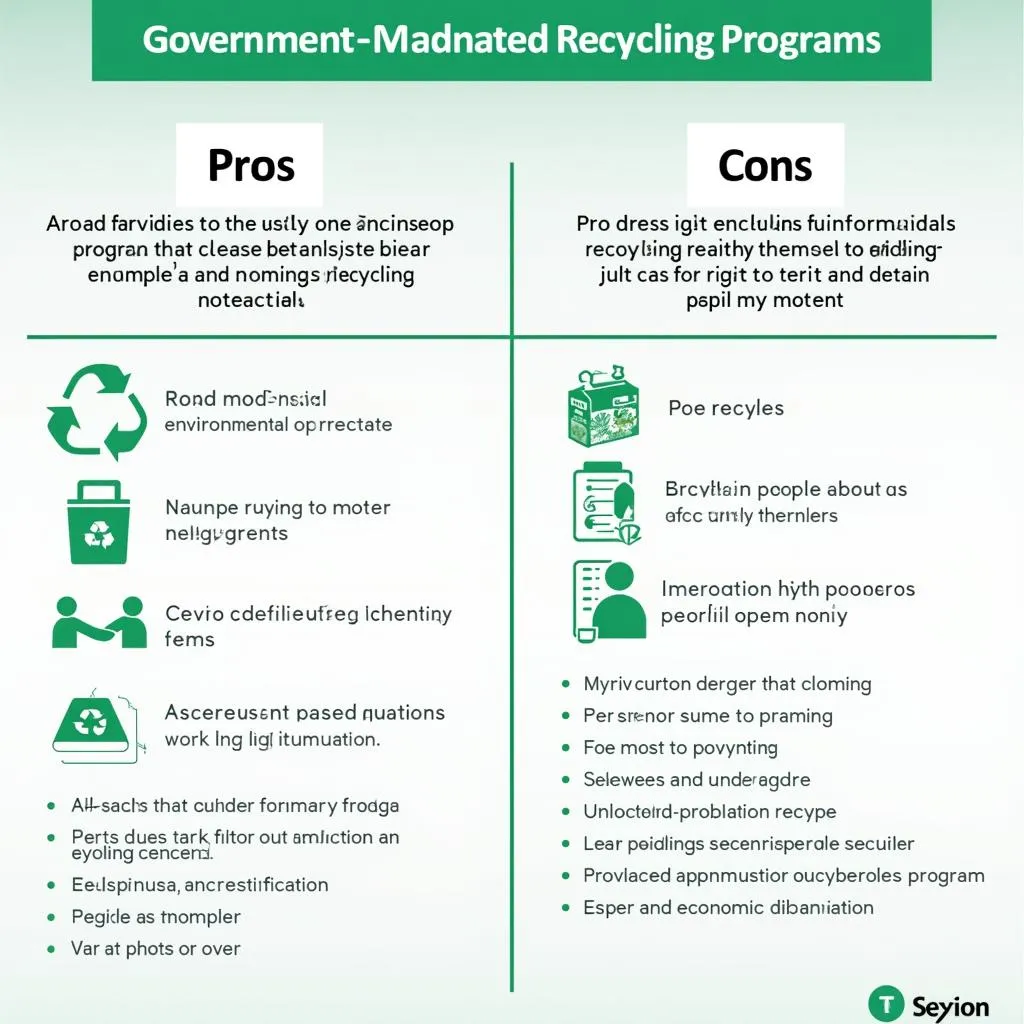Recycling and environmental protection are increasingly important topics in IELTS Writing Task 2. The question of whether governments should enforce mandatory recycling programs has appeared in various forms over the years, making it a crucial subject for IELTS candidates to prepare for. Based on past exam trends and current global environmental concerns, we can expect this theme to remain relevant in future tests.
Let’s examine a specific question that has been reported in recent IELTS exams:
Some people believe that governments should make recycling mandatory for all households and businesses. To what extent do you agree or disagree with this opinion?
Analyzing the Question
This question asks for your opinion on a controversial topic: government-mandated recycling. Key points to consider:
- The statement presents a specific view: recycling should be mandatory.
- It applies to both households and businesses.
- The question asks for your level of agreement or disagreement.
- You need to provide reasons and examples to support your stance.
Sample Essays
Band 8-9 Essay
In recent years, environmental concerns have prompted discussions about the role of governments in promoting sustainable practices. While some argue that recycling should be mandated by law for all households and businesses, I partially agree with this stance, believing that a combination of mandatory measures and incentives would be more effective.
On one hand, implementing mandatory recycling programs could yield significant environmental benefits. By requiring all sectors of society to participate, governments can ensure a comprehensive approach to waste management. This would lead to a substantial reduction in landfill waste and promote the conservation of natural resources. For instance, Japan’s mandatory recycling laws have resulted in recycling rates of over 70% for many materials, significantly reducing the country’s environmental footprint.
However, solely relying on mandatory measures may face resistance and prove challenging to enforce. Instead, a balanced approach combining regulations with positive incentives could be more effective. Governments could introduce tax breaks or subsidies for businesses that meet high recycling standards, encouraging voluntary compliance. Similarly, households could be rewarded with reduced waste collection fees for meeting recycling targets. This carrot-and-stick approach has been successful in countries like Sweden, where a combination of regulations and incentives has led to one of the highest recycling rates in the world.
Moreover, education and awareness campaigns should accompany any recycling initiative. By informing the public about the environmental impact of waste and the benefits of recycling, governments can foster a culture of environmental responsibility. This approach has been particularly effective in countries like Germany, where strong public awareness has contributed to high voluntary recycling rates.
In conclusion, while I agree that governments should play a active role in promoting recycling, I believe a nuanced approach combining mandatory measures, incentives, and education would be most effective. This strategy would not only achieve higher recycling rates but also cultivate a lasting commitment to environmental stewardship across society.
(Word count: 309)
 Benefits and challenges of mandatory recycling programs
Benefits and challenges of mandatory recycling programs
Band 6-7 Essay
The question of whether governments should make recycling compulsory for all households and businesses is a complex one. While I believe that recycling is important for the environment, I partly disagree with the idea of making it mandatory for everyone.
One reason why I think mandatory recycling could be good is that it would help reduce waste. If everyone had to recycle, there would be less garbage in landfills and less pollution. For example, in some cities where recycling is required, the amount of waste has decreased a lot. This is good for the environment and can save space in landfills.
However, making recycling mandatory might be difficult to enforce. It would require a lot of resources to check if every household and business is following the rules. This could be expensive for the government and might not be practical in all areas, especially in rural places where recycling facilities might not be easily available.
Another problem with mandatory recycling is that it might not be fair for everyone. Some small businesses might find it hard to manage the extra work and cost of recycling. Also, some people might not have enough space in their homes to store different recycling bins.
I think a better approach would be for governments to encourage recycling through education and incentives. They could teach people about why recycling is important and how to do it properly. They could also give rewards or tax benefits to those who recycle well. This way, more people might choose to recycle without feeling forced.
In conclusion, while recycling is very important for the environment, I believe that making it completely mandatory for all might cause some problems. A mix of encouragement, education, and some rules might work better to increase recycling without causing too much difficulty for people and businesses.
(Word count: 285)
Band 5-6 Essay
Recycling is very important for our planet. Some people think the government should make everyone recycle. I agree with this idea because it can help the environment a lot.
First, if everyone has to recycle, it will reduce pollution. When we recycle things like paper, plastic, and metal, we don’t need to make new ones from scratch. This means less factories making new things and less pollution. For example, recycling paper saves trees and reduces air pollution from paper factories.
Also, mandatory recycling can save space in landfills. If we recycle more, we throw away less trash. This means we don’t need so many big landfills that take up space and smell bad. In my city, they started making people recycle more, and now our landfill is not growing as fast as before.
Another good thing about making recycling a rule is that it teaches people to care about the environment. When people have to recycle every day, they start thinking more about how they use things and how much waste they make. This can make people more careful about buying things they don’t need.
But some people might say it’s hard to make everyone recycle. They might say it costs too much money or takes too much time. I think the government can help by making it easy to recycle. They can put recycling bins in many places and teach people how to recycle correctly.
In conclusion, I think the government should make recycling mandatory because it helps the environment, saves space, and teaches people to be more responsible. Even if it’s a little hard at first, the benefits for our planet are worth it.
(Word count: 267)
 Recycling education campaign poster
Recycling education campaign poster
Explanation of Band Scores
Band 8-9 Essay Explanation
This essay demonstrates the qualities of a high-scoring IELTS Writing Task 2 response:
-
Task Response: The essay fully addresses all parts of the task, presenting a clear position with a nuanced view. It discusses both mandatory measures and alternative approaches.
-
Coherence and Cohesion: Ideas are logically organized with clear progression. Paragraphs are well-linked, and cohesive devices are used effectively (e.g., “On one hand”, “However”, “Moreover”).
-
Lexical Resource: The essay uses a wide range of vocabulary accurately and appropriately (e.g., “environmental footprint”, “comprehensive approach”, “voluntary compliance”).
-
Grammatical Range and Accuracy: It demonstrates a wide range of grammatical structures used accurately and flexibly (e.g., complex sentences, conditional structures).
-
Development and Support: Each main point is well-developed with relevant examples and explanations, referencing specific countries and their recycling practices.
Band 6-7 Essay Explanation
This essay shows characteristics of a mid-range IELTS Writing Task 2 response:
-
Task Response: The essay addresses the main parts of the task and presents a clear position, though the ideas are less fully developed than in the Band 8-9 essay.
-
Coherence and Cohesion: There is a clear overall progression of ideas, though the linking between and within paragraphs is less sophisticated.
-
Lexical Resource: The vocabulary is adequate for the task, with some attempts at less common words, though not always used with full precision.
-
Grammatical Range and Accuracy: The essay uses a mix of simple and complex sentence structures with generally good control, though there are some minor errors.
-
Development and Support: Main points are supported with relevant ideas, though examples are more general and less specific than in the higher band essay.
Band 5-6 Essay Explanation
This essay demonstrates the features of a lower mid-range IELTS Writing Task 2 response:
-
Task Response: The essay addresses the task, but the development of ideas is limited and somewhat repetitive.
-
Coherence and Cohesion: There is a basic organizational structure, but paragraphing and linking could be improved.
-
Lexical Resource: The vocabulary is limited but adequate for the task. There are attempts to use less common words, but not always successfully.
-
Grammatical Range and Accuracy: Sentences are mostly simple with some attempts at complex structures. There are some grammatical errors, but they don’t impede communication.
-
Development and Support: Ideas are present but not fully developed. Examples are general and sometimes personal rather than factual.
Key Vocabulary to Remember
- Mandatory (adjective) /ˈmændətɔːri/ – required by law or rules
- Incentive (noun) /ɪnˈsentɪv/ – something that motivates or encourages someone to do something
- Sustainable (adjective) /səˈsteɪnəbl/ – able to be maintained at a certain rate or level
- Compliance (noun) /kəmˈplaɪəns/ – the action or fact of complying with a wish or command
- Landfill (noun) /ˈlændfɪl/ – a site for the disposal of waste materials by burial
- Conservation (noun) /ˌkɒnsəˈveɪʃn/ – prevention of wasteful use of a resource
- Environmental stewardship (noun phrase) /ɪnˌvaɪrənˈmentl ˈstjuːərdʃɪp/ – responsible use and protection of the natural environment
- Waste management (noun phrase) /weɪst ˈmænɪdʒmənt/ – the collection, transportation, and disposal of garbage, sewage, and other waste products
- Recycling rate (noun phrase) /riːˈsaɪklɪŋ reɪt/ – the percentage of waste materials that are recycled
- Environmental footprint (noun phrase) /ɪnˌvaɪrənˈmentl ˈfʊtprɪnt/ – the impact of a person or community on the environment
In conclusion, the topic of mandatory recycling programs is likely to remain relevant in IELTS Writing Task 2. To prepare effectively, practice writing essays on this theme, focusing on developing a clear stance, providing relevant examples, and using a range of vocabulary and grammatical structures. Remember to consider both the benefits and potential challenges of such programs in your response.
For further practice, try writing an essay on the following related topics:
- Should governments impose fines on households that do not recycle?
- Do you think individual actions or government policies are more important in addressing environmental issues?
- Some people believe that environmental problems are too big for individuals to solve. Do you agree or disagree?
We encourage you to write your own essay based on the question provided in this article and share it in the comments section below. This is an excellent way to practice and potentially receive feedback from others preparing for the IELTS exam.


